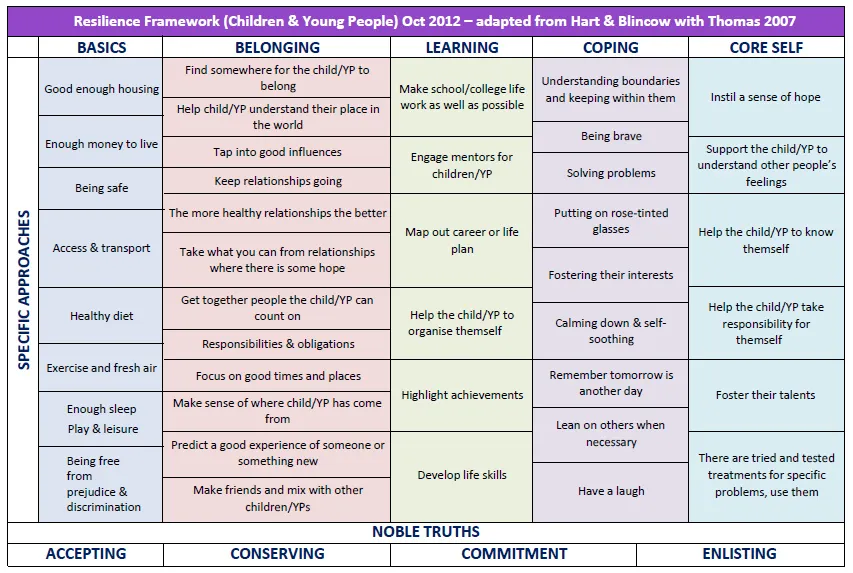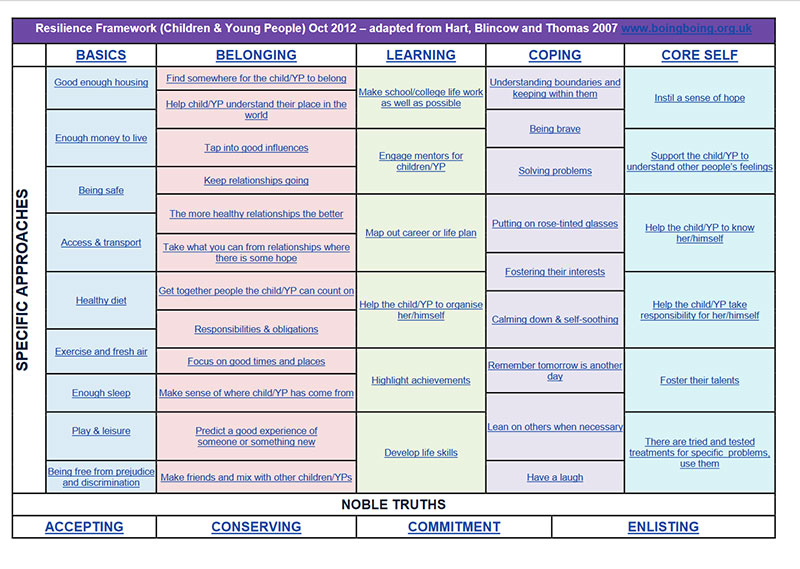Boingboing's resilience approach
When people think about resilience, they usually think about overcoming difficulties, despite the odds stacked against them.
They might describe resilience as beating the odds, doing better than expected given the circumstances or bouncing back when things get tough. While overcoming adversity is an important aspect of resilience, we think resilience is more than that.
Boingboing's resilience approach
When people think about resilience, they usually think about overcoming difficulties, despite the odds stacked against them.
They might describe resilience as beating the odds, doing better than expected given the circumstances or bouncing back when things get tough. While overcoming adversity is an important aspect of resilience, we think resilience is more than that.
For us in the Boingboing community it’s about also changing the odds, so that the world we live in becomes a fairer place for everyone.
This is why we describe resilience as:
“Beating the odds whilst also changing the odds” Hart et al., 2016
Often the odds are stacked against people due to the disadvantages they face, disadvantages that a lot of the time are the result of unfair systems in our society. Like those of us who have experienced prejudice and discrimination due to poverty, having a disability, experiencing racism, being from our LGBTQ+ community or having experience of the criminal justice system (as just some examples). Changing these systems to make the world a fairer place is called social justice.
Resilience is working together to overcome adversity, whilst also changing, or even dramatically transforming (aspects of that adversity)
This means that we don’t think resilience is just about an individual finding ways to bounce forward when things are tough (beating the odds), but that we also recognise inequality plays a big part in making things tougher in the first place, and so resilience is also about challenging inequalities too (changing the odds). When definitions of resilience focus too heavily on finding ways that people can beat the odds, it not only makes us more likely to think of resilience as a personal characteristic, but it also discourages people from challenging the sort of difficulties that result from unfair systems in our society.
Here in the Boingboing community we take what is called a ‘systems view’ and adopt a socio-ecological approach looking beyond what can be done to help individuals (which is still an important thing to do), and identifying ways in which the environment people live in can better support them, as well as finding ways to reduce difficulties in the first place.
As a result our work has a strong focus on thinking about and addressing mental health and wellbeing from an inequalities perspective. We suggest ways in which researchers and practitioners might join with people facing particularly difficult challenges to try to disrupt, ‘nudge’ or even radically transform some of the larger social systems, so that they better support their needs (Hart & Aumann, 2017).
This is why much of our work centres co-production and activism. Co-productive research and practice is when you work as, with and alongside people facing disadvantages. This approach is perhaps best summed up in this quote by the British Psychological Society who have recently adopted our definition of resilience:
We need to change how we work in formal services and be ‘brave enough to work with and through others, dropping ‘done to’ models and swapping for ‘done with’… This might mean we need to find meaningful ways to work with people facing adversity on overcoming that adversity, through co-production, alliances and partnerships. So, this is not just about switching location from the clinic, classroom or workplace to community spaces, it is about changing the ways we work.
It is fundamental that as [researchers and practitioners] we work to recognize our own membership and responsibility in our communities. This may involve relinquishing expert ideologies and ‘us’ and ‘them’ narratives. Reconnecting with ourselves and others with humility and open-heartedness, may help to rebuild trust with communities we may have intentionally or unintentionally harmed.
It is also why so many of us in the Boingboing and Resilience Revolution community have faced different forms of adversity throughout our lives and why our quirky community is made up of such a mix of identities. This helps keep everything we do at Boingboing focused on working in a way that upholds the principle of nothing about us without us.
This quirky, collective identity gives us the passion to continuously challenge real-world inequality through our social justice approach, all the while trying to maintain academic rigour. It’s a tricky tightrope to walk but we feel it’s worth it, to bring our research and practice approach to life.
Resilience Framework
The Resilience Framework is based on Resilient Therapy (RT), the name we’ve given to the set of ideas and practices originally developed by Angie Hart and Derek Blincow, with help from Helen Thomas.
Are there things we can do in our lives or at work to build ways of managing life resiliently? What helps us to successfully cope with hazards, stress and adversity? These are the sorts of questions that fed into the Resilient Therapy prompted the development of the Resilience Framework. We have translated resilience research and practice findings into strategic ways of thinking and practical ways of doing, that nurture resilience in children and young people. While the Resilience Framework looks very simple, there’s quite a lot of work behind it.
We have found over the years that most folk interested in resilience, are doing lots of resilient building work already – they just might not have called it that before. So you might find it’s more straightforward than you imagined. There are no strict rules about how to use the Resilient Therapy approach but the Framework is often our starting point.
Using the Resilience Framework in your context
We’re always interested and excited when people want to use our work in new and creative ways or different contexts.
So that we can maintain our academic and intellectual integrity we’ve put together a few guidelines that we’d like you to follow:
- Please clearly acknowledge Boingboing in anything that you draw on in your own work, and add links to the Boingboing website so that users can access the detailed rationale and processes applied to using our tools.
- When you use the Framework please make sure you reference it fully, e.g., ‘Resilience Framework (Children and Young People) Oct 2012 – Boingboing, adapted from Hart and Blincow with Thomas 2007’.
- Please don’t change the Framework! People make lots of really interesting suggestions for things that could be included, some of which do get developed into alternative versions of the Framework (e.g., adult and family versions), but as our work is evidence-based, we need robust supporting evidence to back up any changes. So if you’ve got some evidence and ideas, please use them in your own name or sound them out with us.
- When you are using the Framework we’d ask you to stay true to the Boingboing aim, which is ‘To model and promote resilience research and practice that challenges social inequalities drawing on all our skills as staff, volunteers and friends.’ For us that means working co-productively, inclusively with the individual and wider system or context.
Other versions of the framework
For families
Designed to support members of the wider family (parents, siblings, carers etc.) and was developed by Rhian Adams, Tiffany Bales, Laura Brown and Sarah Henderson from Newport Mind, with the support of the participants of the Newport Mind Community of Practice - health professionals, social workers, young people and parents who had previously received support.
The need for a Family Framework became apparent when resilience workers recognised that a family approach to resilience was needed in order to provide seamless family intervention which would ensure self-sufficiency once support workers withdrew. The terminology was determined by all members of the CoP, ensuring that language and content was universally understandable, and applicable to everyday family life.
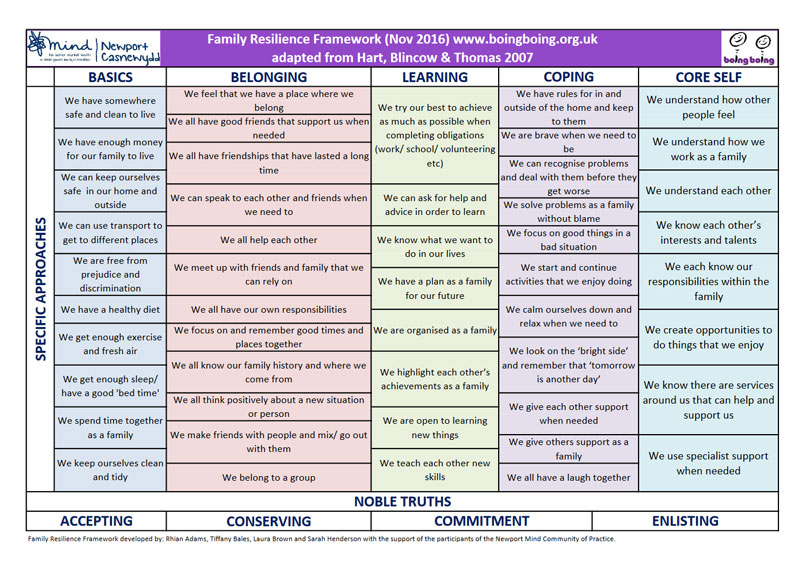
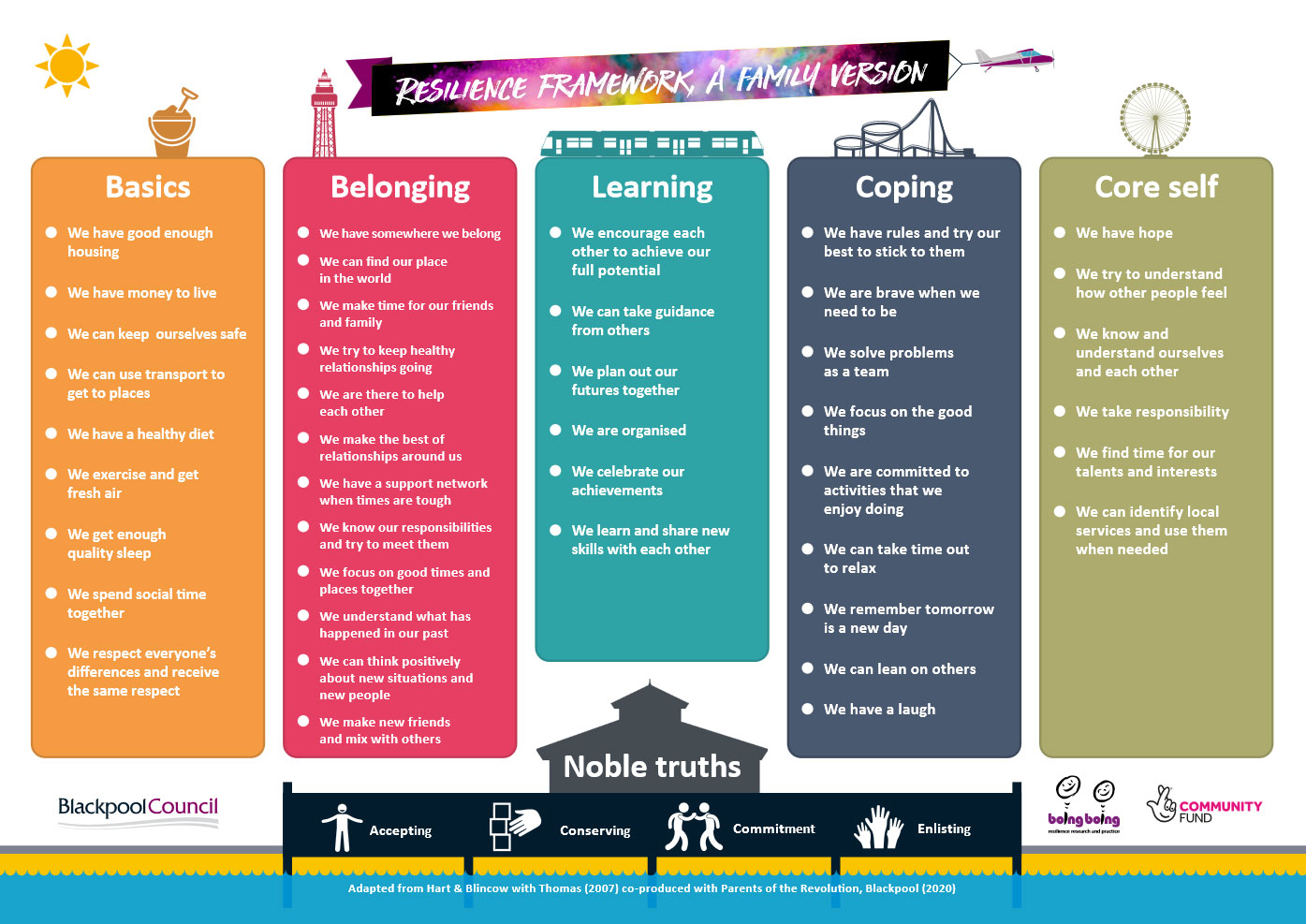
For families Blackpool version
A group of parents and carers from Blackpool, known as the ‘Parents of the Revolution’, have co-produced another family version, building on previous work by Newport Mind and the Framework graphics created as part of Blackpool’s town-wide Resilience Revolution.
The group are rightly proud to be from Blackpool and have chosen landmarks from their town to represent the ideas within the Framework, which could easily be adapted for another area.
For Adults
Applies ideas from the resilience evidence base to adult mental health, drawing on concepts more usually applied in this context, for example the recovery approach.
The adult Framework was developed as part of Josh Cameron’s PhD research into the work-related needs and experiences of people recovering from mental health problems.
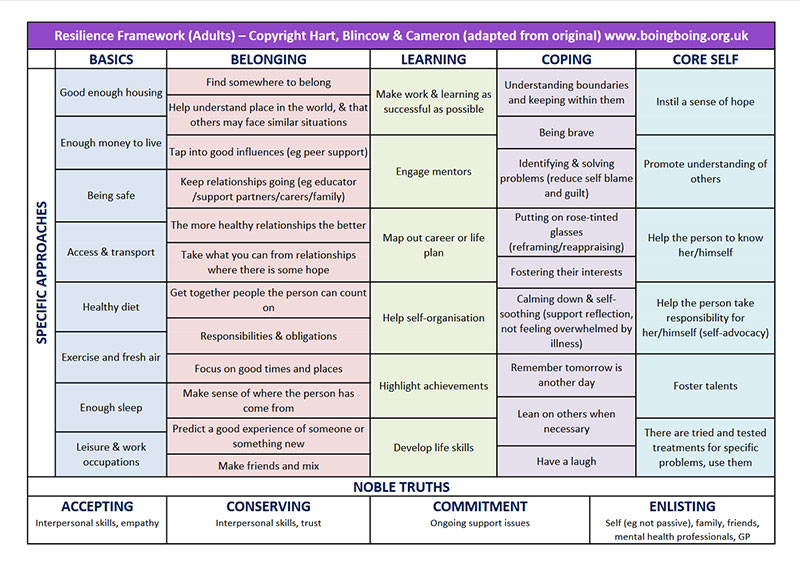
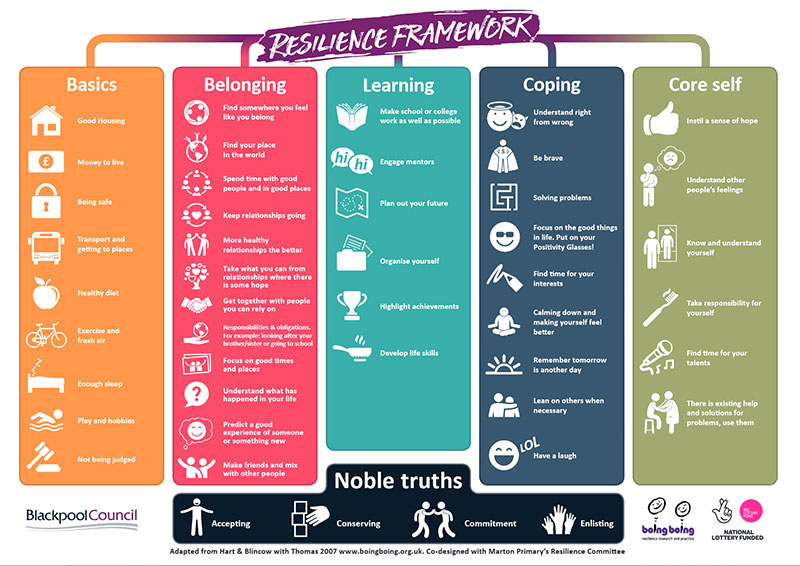
For Primary School Children
Co-produced by the Resilience Committee at Marton Primary School, Blackpool, with the support of Stephen Donnelly, Graphic Designer from Blackpool Council, and Nathan Parker, Youth Engagement Lead for HeadStart Blackpool.
The Marton Primary School children learned some valuable resilience and technological skills during the process, which involved rewording some of the items in a more meaningful way for the children, and we think it looks fab!
Interactive Framework for schools
Designed to be user-friendly, allowing you to click on areas that interest you to find out more. It was developed especially for working with schools, holding the children and young people in mind, and is one of the free suite of resources from the Academic Resilience Approach.
Each link takes you to a glossary section with further information about that particular approach, including expanding on what it is, why it is important and how it could be achieved in a school context, what young people themselves think about it, and examples of relevant research evidence with further references.
We know teachers and school staff are incredibly busy, so we’ve tried to keep it short and sweet, allowing you to dip in and out depending on what you want to know, and giving you a starting point if you want to find out more.
Other versions
Other language versions
Academic Resilience Approach
The Academic Resilience Approach (ARA) is a whole-school-based community development model designed by Angie Hart and Lisa Williams with input from school practitioners and young people.
It aims to equip schools with the tools to support students to overcome adversity and improve their mental health, and, in turn, educational outcomes.
One Head teacher involved in developing Academic Resilience uses a famous quote from NASA to illustrate the idea of a whole school approach:
The folk tale goes like this, one day a visitor came to the space station and asked a cleaner who was sweeping up what job they did there. The cleaner replied ‘I help put men on the moon’.
Imagine what it would be like in your school if every adult in the school community’s answer to a visitor asking what they do was ‘I help our most vulnerable pupils achieve better than any of us could ever have imagined they would’.
This intervention is based on complex systems theory and a social justice-oriented Resilience Framework. The community organisations YoungMinds and Boingboing have adopted the approach and are working in partnership with schools to apply it across the UK and to research its impact through evaluation.
There are many school resilience programmes which aim to narrow the gap between pupils who do well academically and those who don’t. A lot of them are very useful, so why have we put this information together?
- Resilience programmes can be expensive – we wanted to offer something everyone could access for free.
- We have been working on resilience for years, and have developed an approach which many schools find really helpful.
- People keep asking us to put something together specifically for schools to use – that is practical, realistic and easy to follow, and something that inspires people.
- Pupils who experience multiple disadvantages face greater challenges in school than most so we need a programme that really helps them. Academic Resilience supports schools to step up the things they do so there is greater impact on the achievements of their most vulnerable or disadvantaged pupils.
The Academic Resilience Approach provides free, practical resources to help everyone in the school community step up and support pupils’ academic resilience including practical tools, case studies, film clips, and downloads.
Some people in the school community are resilience ‘swots’. They are passionate about building pupils’ resilience and already know a lot about how to do it. They may be using one of the many programmes out there that support this. If so, you may have to check in with those programme co-ordinators as drawing on other sources could affect the programme’s fidelity.
Our resources:
- Help any school establish systems to build ‘resilience approaches’ that support disadvantaged pupils over time through a whole school approach
- Will benefit all pupils from a school-wide approach to increasing academic resilience
- Raise achievement
- Offer ‘quick wins’ that can be implemented immediately
- Help identify pupils who are at risk of not fulfilling their academic potential
- Provide practical approaches to help pupils do better than might be expected
- Offer ideas to help everyone in the school community play a part.
Not sure where to start? Have questions like these?
- What is Academic Resilience?
- How do I improve results through an Academic Resilience Approach?
- Which pupils are we talking about?
- What can schools do?
- How can services support me?
- What about parents?
Activism for Resilience
Informed by our understanding of resilience, defined as ‘beating the odds whilst also changing the odds’, we believe that activism has the potential to offer a radically different way of preventing, addressing and reducing mental health problems through building resilience.
We call this ‘Activism for Resilience’ (A4R). We have undertaken a piece of research to explore this idea funded by the MRC/AHRC/ESRC Research Councils titled “Nothing about us without us: civic activism as a mental health intervention”.
Our sister charity Boingboing Foundation is carrying this work forwards with their Activist Alliance projects. For young people who face major challenges, taking part in community projects and social action may be even more successful than traditional services in improving our mental health.
The Boingboing Foundation is therefore working to bring together young people and our allies in Blackpool to form an Activist Alliance; a collective looking to learn, teach, organise, campaign, fund and disrupt to make change big and small on the issues affecting us and our communities.
Research
Here we offer an overview of some of our key research projects with handy links to thriving areas of research within our community.
In all our projects we aim to co-design, co-produce and co-deliver everything we do. We focus on resilience research and practice with a strong social justice emphasis, which means we seek to tackle disadvantage and bring genuine change to people’s lives around the world.
We are still continually questioning, enriching and developing our approach to resilience, and our priorities have shifted over time. We now have an increasing focus on challenging and changing unjust practices, systems and structures and are moving from research predominantly centred on children and young people to a broader range of those of us facing systemic disadvantage as well. Including, but not limited to, supporting the mental health and resilience of adults in recovery, ex-offenders, practitioners, adults with learning disabilities and more.
Some of our key research projects:
Blackpool’s Resilience Revolution
The Resilience Revolution has delivered an extensive programme of lasting change to disadvantaged young people in the town of Blackpool, through a successful £10.4 million Big Lottery HeadStart funding bid.
Though the Blackpool ‘whole town approach’ pilot has now been completed, the Resilience Revolution lives on in our networks through ongoing collaborative activities.
Academic Resilience Approach
The Academic Resilience Approach (ARA) is a whole-school-based community development model.
It aims to equip schools with the tools to support students to overcome adversity and improve their mental health, and, in turn, educational outcomes. The community organisations YoungMinds and Boingboing have adopted the approach and are working in partnership with schools to apply it across the UK and to research its impact through evaluation.
Cross Cultural Resilience
Resilience has become a key twenty-first century paradigm in research, practice and policy development concerning individuals’ mental health and wellbeing.
The existing literature addressing resilience is extensive; however, most of the studies have been conducted in European countries limiting the generalisability of models to Western cultures. Therefore, there is an emerging need to examine the applicability of resilience models to non-Western countries. Overcoming and challenging adversity conditions might require different practices in non-Western contexts.
The Imagine Programme
The Imagine Programme was a five-year project running from 2013 to 2017 which brought together different research projects working together across universities and their local communities.
We experimented with different forms of community-building that ignite imagination about the future and help to build resilience and a momentum for change. Our research group looked at ‘The social context of civic engagement’ using the concepts of Communities of Practice (CoP), resilience, Community University Partnerships (CUPs), and co-production.
Nothing About Us Without Us
The University of Brighton led a £100,000 research project ‘young people’s activism’ and is working alongside youth researchers who have themselves experienced mental health issues.
The project aims to understand if activism can boost identity and sense of belonging in young people who all are too easily denied opportunities.
Patterns of Resilience to Drought
The expertise of young people in South Africa in relation to coping with the physical and mental impacts of drought was harnessed for this co-productive research project led by Professor Angie Hart.
Professor Hart’s team focussed on young people in the South African municipality of Govan Mbeki in this key multi- and cross-disciplinary research project. Our researchers collaborated closely with international partners including Khulisa Social Solutions, Boingboing and leading academics in the UK, South Africa and Canada.
Other publications from the Boingboing community
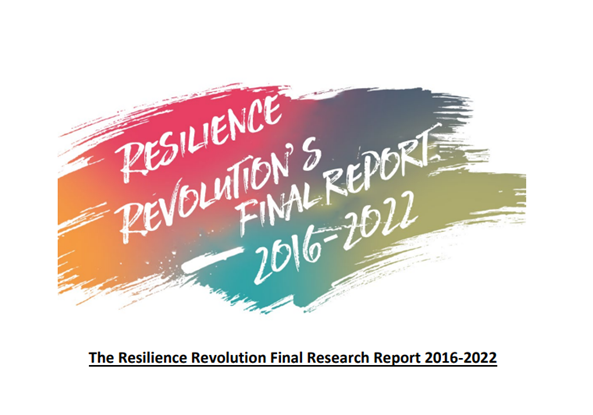
Resilience Revolution’s Final Research Report 2016-2022
This report presents the research and evaluation of the Resilience Revolution programme (2016-2022).
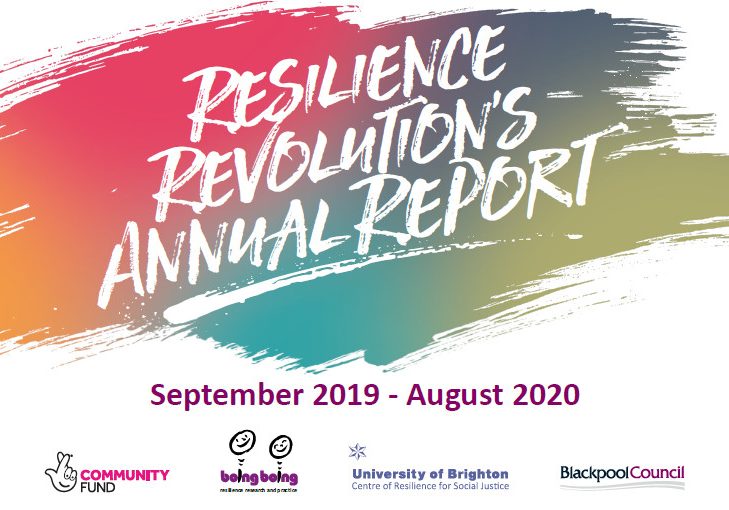
Resilience Revolution Annual Report 2019-2020
This annual report shares the fantastic work that is happening in Blackpool to make things better for all young people across the town. It documents all the things the Resilience Revolution community have been up to in the last year and the changes that are being made.
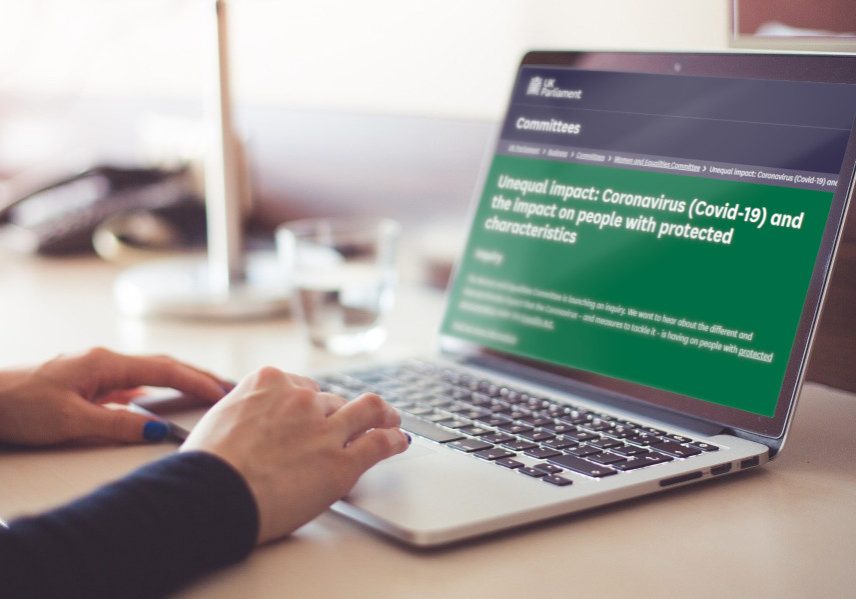
Disproportionate impact of COVID-19 on people with disabilities: Follow up
In a follow up to our previous submission, we draw on our collective organisational and personal experiences, relating them to policy and practices associated with COVID-19, disabilities and equalities more generally.
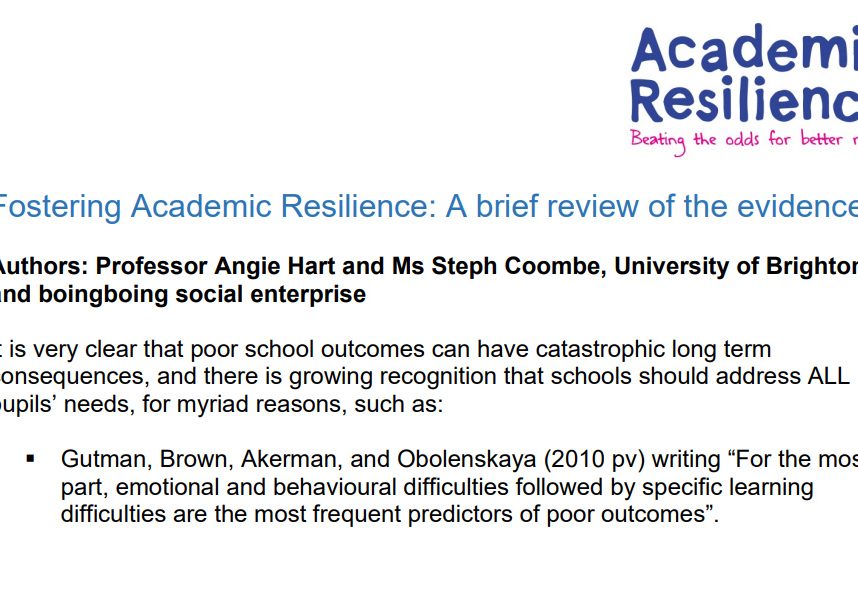
Fostering academic resilience a brief review of the evidence base
It is very clear that poor school outcomes can have catastrophic long-term consequences, and there is growing recognition that schools should address ALL pupils’ needs. This brief review of the evidence explores what is meant by the term resilience and gives an overview of what schools can do to foster it in their pupils.
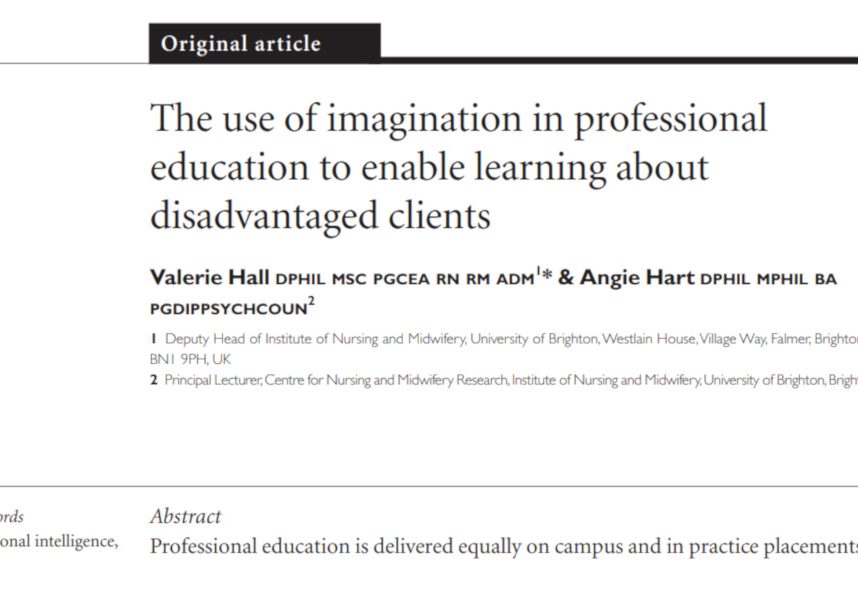
The use of imagination in professional education to enable learning about disadvantaged clients
In this paper we propose that creative methods of learning such as developing the use of imagination may have more direct application in bringing into the public domain previous implicit learning experiences. From the findings of this research, we created a learning model which can be used by lecturers or practice educators either in the campus or practice settings.
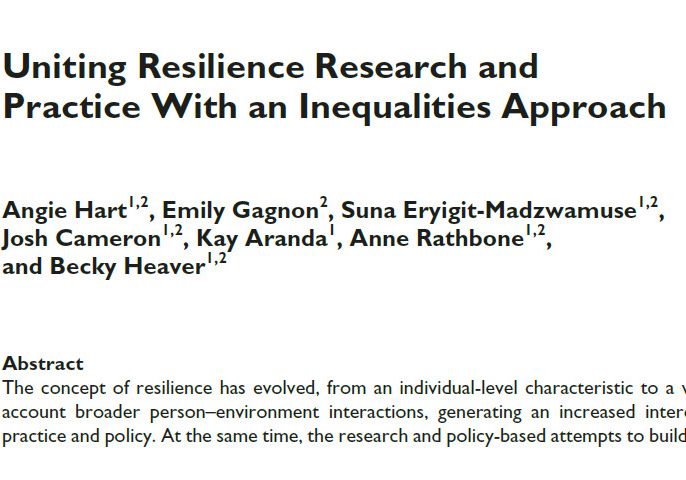
Uniting Resilience Research and Practice With an Inequalities Approach
This article outlines and provides examples from an approach that we are taking in our research and practice, which we have called Boingboing resilience. We argue that it is possible to bring resilience research and practice together with a social justice approach, giving equal and simultaneous attention to individuals and to the wider system.
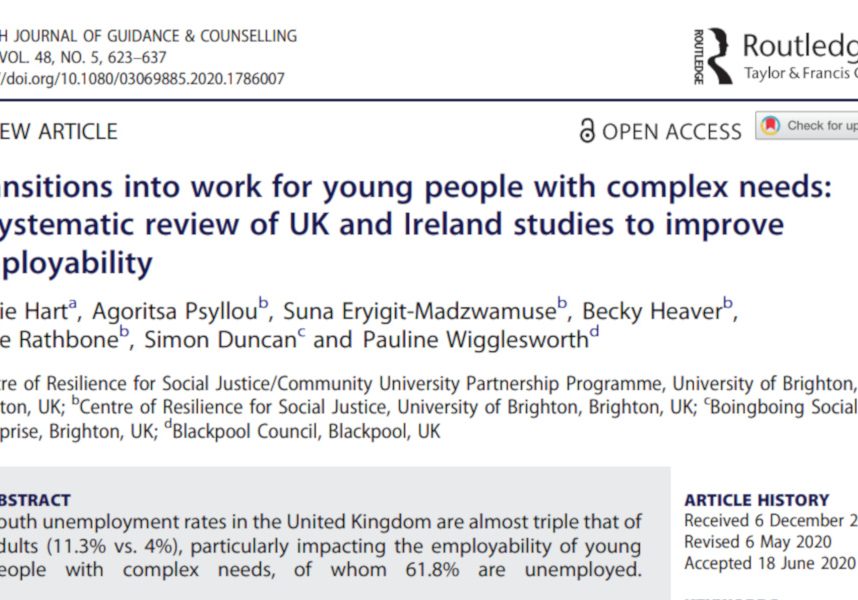
Transitions into work for young people with complex needs: a systematic review
The main objectives of this review were to explore current practices, identify factors affecting and strategies used to improve employability. Findings suggest that collaborative strategies covering training, work practices, therapeutic support and creating appropriate work environments, with active involvement of young people, are key in supporting young people with complex needs into employment.
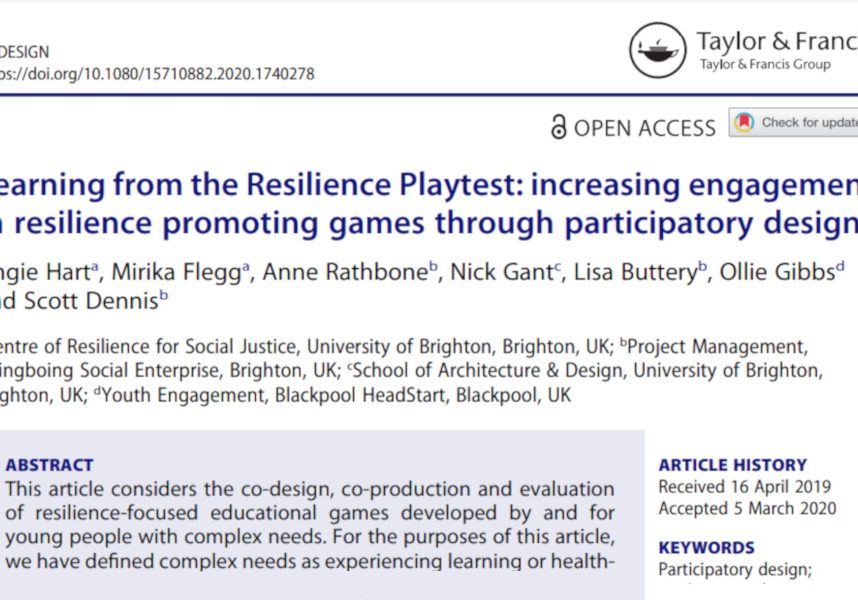
Learning from the Resilience Playtest: increasing engagement in resilience promoting games
This article considers the co-design, co-production and evaluation of resilience-focused educational games developed by and for young people with complex needs. Using the development of these games and the results of the evaluation as a case study, it addresses key debates surrounding participatory design within the context of social inequalities.
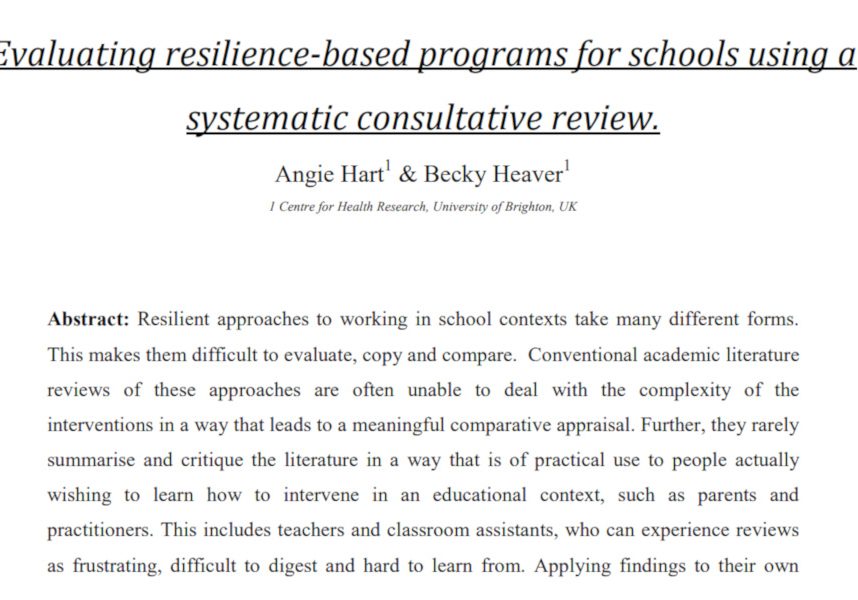
Evaluating resilience-based programs for schools using a systematic consultative review
The aim of this paper is to explain how and why school-based resilience approaches for young people aged 12-18 do (or do not) work in particular contexts, holding in mind the parents and practitioners who engage with young people on a daily basis, and whom we consulted in the empirical element of our work, as our audience.
